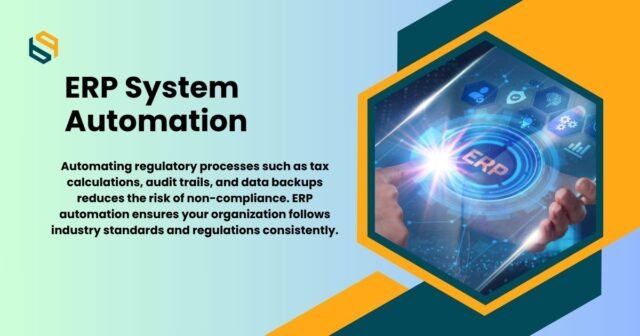Enterprise Resource Planning (ERP) system has revolutionized the way of operating businesses, but by integrating automation into these systems, their benefits are completely taken to a new level. ERP system automation streamlines complex processes, reduces human errors and increases efficiency, allowing organizations to remain competitive in digital marketplaces quickly.
If your business is struggling with manual procedures or dissatisfied systems, this blog will help you understand what, why and how you understand ERP system automation. We will break the significant benefits, greater use cases and steps to implement automation in your ERP system.
What Is ERP System Automation?
The ERP system refers to benefit from rehearsal technology and time-intensive tasks within the ERP software without the need for an automation manual. Whether it is automated data synchronization, workflow construction or real -time reporting, automation reduces automation human intervention and makes processes more effective.
By adding departments such as sales, supply chains, finance and marketing under an integrated system, automation in the ERP system ensures that all procedures basically run.
Why ERP System Automation Matters
ERP systems are already powerful tools, so why does automation matter? Here are a few reasons:
- Time Savings: Automating routine tasks such as invoicing, payroll, and inventory management significantly reduces the time spent on labor-intensive processes.
- Error Reduction: Manual data handling is prone to mistakes. Automation eliminates these errors by ensuring accuracy, especially in data entry and calculations.
- Improved Scalability: With automation, your ERP system can easily handle larger workloads and adapt as your business grows.
- Enhanced Decision-Making: Automated processes provide real-time data, enabling businesses to make informed and timely decisions.
- Cost Efficiency: By reducing reliance on manual labor and improving process speed, automation leads to long-term cost savings.
Key Benefits of ERP System Automation
1. Streamlined Operations
Automation ensures consistency and speed across your operations. For instance, during order fulfillment, automated ERP systems can generate shipping labels, track logistics, and update inventory records instantly.
2. Real-Time Data Analysis
Automated ERP systems continuously gather and analyze data, offering real-time insights into organizational performance. This allows for quick adjustments to strategies and day-to-day decisions.
3. Integrated Processes
Automation strengthens communication among departments by facilitating seamless handoffs. For example, when a sales order is entered, the system can automatically notify warehouse teams for fulfillment and accounting teams for invoice creation.
4. Improved Compliance
Automating regulatory processes such as tax calculations, audit trails, and data backups reduces the risk of non-compliance. ERP automation ensures your organization follows industry standards and regulations consistently.
5. Scalable Growth
Automation empowers small and medium-sized businesses to scale their operations effortlessly. From handling sudden increases in demand to managing new product launches, ERP automation remains efficient under pressure.
Learn more about API for Real-Time Data Sync
Use Cases for ERP System Automation
Automating Inventory Management
For businesses with warehousing needs, ERP automation can track stock levels and automatically reorder products when inventory falls below a set threshold. This prevents both overstocking and stockouts.
Streamlining Financial Processes
ERP automation simplifies accounting tasks such as payroll processing, invoice generation, and expense tracking. For instance, the system can automatically calculate tax deductions and generate payroll slips, saving the finance team hours of work.
Optimizing Supply Chain Management
An automated ERP system can enhance supply chain visibility by providing real-time updates on shipping, delivery, and vendor performance. Automation also ensures faster procurement processes by directly integrating with supplier systems.
Enhancing Customer Relationship Management (CRM)
Automated ERP systems can improve CRM by tracking customer interactions, analyzing sales trends, and setting up reminders for follow-ups. This enables personalized service and develops stronger customer relationships.
Simplifying Reporting
Manual report creation is a time sink. With automation, ERP systems generate custom reports automatically, helping stakeholders make data-backed decisions without delay.
How to Successfully Implement ERP System Automation
Evaluate Your Business Needs
Start by identifying tasks and processes that can benefit the most from automation. Are you looking to automate invoicing, inventory tracking, or employee onboarding? Defining your priorities ensures a focused implementation.
Choose the Right ERP Vendor
Selecting an ERP system with robust automation features is key. Look for platforms that offer scalability, seamless integration with existing tools, and a user-friendly interface.
Define Clear Objectives
Set measurable goals to track the success of automation. For example, aim to reduce invoice processing time by 50% or cut manual stock entry errors by 75% within six months.
Invest in Training
Automation will only succeed if your team understands how to use the system effectively. Allocate time and resources to train your employees on the new ERP platform and its automated features.
Monitor and Optimize
Automation is not a “set it and forget it” solution. Continuously evaluate system performance and make adjustments to optimize efficiency.
The Future of ERP System Automation
ERP automation is no longer a luxury; This is a requirement. As technology develops, emerging innovation such as artificial intelligence (AI) and machine learning (ML) will increase automation in the ERP system further. Business Resolution These advanced solutions will enjoy a unique competitive advantage.
Unlock the Power of Automation Today
ERP System is a game switch for organizations seeking automation efficiency, agility and development. Whether you want to streamline your workflows, optimize your supply chain or provide better customer service, the automation keeps the key to unlock new opportunities.
To find out how ERP system automation can change your business, you can start by evaluating your procedures and selecting the right automation equipment to suit your needs.







